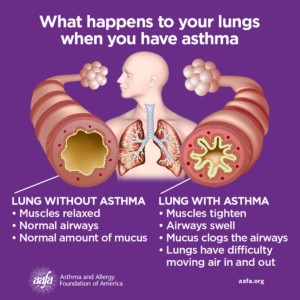Asthma Clinic
 A specialized asthma clinic is a healthcare facility or program that focuses on the diagnosis, treatment, management, and education related to asthma. These clinics are designed to provide comprehensive care for individuals with asthma and help them achieve optimal control of their condition.
A specialized asthma clinic is a healthcare facility or program that focuses on the diagnosis, treatment, management, and education related to asthma. These clinics are designed to provide comprehensive care for individuals with asthma and help them achieve optimal control of their condition.
Here are some key aspects of a specialized asthma clinic:
1. Asthma Assessment and Diagnosis: The clinic conducts thorough assessments to accurately diagnose asthma and determine the severity of the condition. This may involve medical history evaluations, physical examinations, lung function tests (such as spirometry), and allergy testing to identify triggers.
2. Individualized Treatment Plans: Specialized asthma clinics develop personalized treatment plans based on the individual's specific needs, symptoms, and asthma severity. The treatment plan may include medications, such as inhalers (bronchodilators and corticosteroids), oral medications, or biologics, as well as recommendations for environmental control and lifestyle modifications.
3. Asthma Education and Self-Management: Clinics emphasize patient education to promote self-management skills and empower individuals to effectively manage their asthma. Education may cover topics such as recognizing and avoiding triggers, proper inhaler technique, understanding medication usage, monitoring symptoms, and developing an asthma action plan.
4. Asthma Action Plans: Asthma clinics provide personalized asthma action plans that outline step-by-step instructions for managing asthma symptoms and exacerbations. These plans help individuals recognize when to adjust medications, when to seek emergency care, and provide guidance on self-treatment based on symptom severity.

5. Asthma Control Monitoring: Specialized asthma clinics often utilize regular monitoring to assess asthma control and adjust treatment as needed. This may involve periodic follow-up appointments, lung function tests, symptom assessments, and monitoring of medication adherence to ensure optimal control and adjust treatment plans if necessary.
6. Allergy Management: Many asthma clinics also provide specialized services for individuals with asthma and allergies. They may offer allergy testing and immunotherapy (allergy shots or sublingual tablets) to help manage allergic triggers that can worsen asthma symptoms.
7. Multidisciplinary Team: Asthma clinics often have a multidisciplinary team of healthcare professionals dedicated to asthma management. This may include pulmonologists, allergists, respiratory therapists, nurses, and asthma educators who collaborate to provide comprehensive care and expertise in asthma management.
A specialized asthma clinic can provide individuals with asthma access to comprehensive care, education, and support to effectively manage their condition. By working closely with healthcare professionals in an asthma clinic, individuals can gain better control of their asthma symptoms, reduce exacerbations, and improve their overall quality of life.

